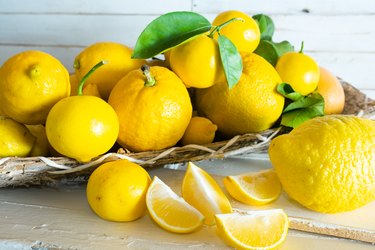
Many people are unaware that seedless lemons exist, and other than the lack of seeds, there is no difference. The benefit, of course, is that you do not have to remove or pick out the seeds when using these fruits. This seedless trait can be a real time saver when juicing lemons or using sliced ones in drinks and recipes.
Wonderful Seedless Lemons
Video of the Day
Almost every kind of "true" variety has seeds inside, but how many seeds are in a lemon? The amount can range from just a few to dozens depending on the variety, pollination and season. They're not all yellow on the outside; one actually looks like a miniature watermelon while it is growing. It isn't really possible to pick out a seedless yellow lemon from a regular one since they look pretty much the same from the outside. So, how do you find them?
Video of the Day
The Wonderful Company grows and sells seedless lemons and started doing this after partnering with an Australian farmer who had located a seedless lemon tree on his property. It was a natural mutation that turned into a superstar. The seedless lemons are sold in grocery stores across the United States, like Shoprite and Kroger. You can find them in produce departments, but they are not sold individually like other lemons. Look for the bagged ones with the large green labels showing the company name.
How to Identify Lemon Varieties
True lemons are all variants of the Citrus limon species, and there are many known varieties plus wild and established hybrids. To be considered a true lemon, the fruit must be classified under C. limon. You are probably familiar with these examples, which are not true ones: kumquat, mandarin orange and key lime. The familiar true lemon varieties often seen include the Lisbon and Eureka.
The Bearss lemon is similar to the Lisbon, with fruits that measure about 3 to 4 inches across. Pink variegated lemons are the ones that look like miniature watermelons before ripening; the outer skin turns yellow as it ripens. The inner flesh is pink and has a milder taste than other lemon varieties; you should harvest them when the outer skin is still striped.
How to Buy Lemons
Whether buying individual or bagged lemons, you'll want ones that are bright in color without any spots or discoloration. You'll be able to see through the bags, so this should not be a problem. The ones that feel dense and have a little bit of give when squeezed are generally the juiciest. If you are buying a bag and don't plan on using them all at once, look for ones that aren't too ripe.
If the lemons are underripe, you can leave them on your counter for a day or two, but you will want to keep an eye on them. If they start to lose their color, they may be too ripe to use. Generally, lemons will keep in a refrigerator for about two weeks. It is best to store them in zip-top bags or sealed containers to prevent them from drying out so that you can reach that time.